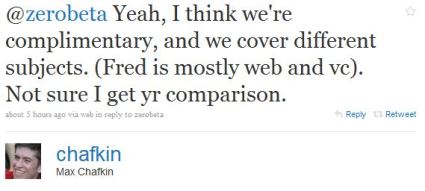The Rise of Decentralized Expert-in-Field Media or How Fred Wilson Killed Inc Magazine
Today after browsing Inc Magazine’s website, I came to the realization that I haven’t read anything on Inc Magazine in quite some time. Right afterwards I tweeted that Fred Wilson killed Inc Magazine:
Max Chafkin, a writer at Inc Magazine, came to Inc Magazine’s defense and, quite understanably, asked for me to clarify:
Since what I tweeted was a bit of an over-generalization, as Inc. is not really dead nor killed by Fred Wilson alone, and since I was at one time an avid Inc. reader (and subscriber), I believe I owe Max an explanation.
What I was referring to the Rise of Decentralized Expert-In-Field Media.
For many years, Inc. Magazine was the place to go for information and articles for entrepreneurs and those working in early-stage companies. As someone working in the early-stage web space, each month I would look forward to the next issue and spend the day reading it cover-to-cover. Then everything changed. Many VC’s and entrepreneurs began popping up with their own blogs. Aggregators/Curators like Hacker News and Silicon Alley Insider popped up providing people with fast and wide distribution, and all of a sudden I didn’t have to wait each month to get this information from Inc.
This is all part of a larger movement going in media, that isn’t really new to anyone in the field. It is stronger in some verticals than others but two main characteristics of this movement are affecting nearly every vertical:
Decentralized Content, Better Distribution
The new experts are building audiences on their own sites rather than simply publishing on sites or in magazines like Inc. Magazine. Aggregators and Curators as well as Social Media are allowing them to quickly and easily distribute their content. For example, I follow @IncMagazine on Twitter but still rarely go to their site anymore, as it is almost impossible for them to stay ahead of the story when the story is coming from decentralized sources that are distributed quickly.
First Person Expert-In-Field vs. Third Person Expert-Of-Field
It’s incredibly easy to post online now starting to get even easier to access distribution to the masses. Why read a story on a person or company when you can hear directly from the person or company? If you’re the expert-in-the-field, why go through a middleman when you can control your message? Maybe 3 years ago the audience you could reach would make the difference but not these days. There is still a big place for third person, exposé-type journalism, as first person journalism introduces an inherent bias, but that can also be accomplished by experts in the field as the blogosphere is one ongoing conversation and who has better information than those in the field.
At StockTwits we are taking advantage of this trend in the finance vertical through all the amazing traders and investors on the streams, Chart.ly, and StockTwits.tv, and on the aggregation curation side with Abnormal Returns. I believe we are still in the early innings of this movement and, unfortunately, most of the incumbents are not going to escape alive. So while Fred Wilson certainly hasn’t “killed” Inc. Magazine yet, they are slowly dying by cuts from a thousand Fred’s.
-
1
Pingback on Aug 27th, 2010 at 5:12 am
[…] Read the rest of this post on the original site » Tagged: Internet, Twitter, Voices, innovation, media, Fred Wilson, Inc. Magazine, Justin Paterno, Max Chafkin, Zerobeta | permalink Sphere.Inline.search("", "http://voices.allthingsd.com/20100827/the-rise-of-decentralized-expert-in-field-media/"); « Previous Post Next Post » ord=Math.random()*10000000000000000; document.write(''); […]
-
2
Pingback on Aug 31st, 2010 at 9:41 am
[…] Paterno offers a reader’s perspective on getting timely information from knowledgeable sources, that helps explain why magazine sales […]








August 24, 2010 at 10:36 pm
Fred is a cold blooded killer and I love it. His style is authentic and that trumps a well educated business journalist any day. Go get ’em Fred.
August 24, 2010 at 11:55 pm
I was curious about the tweet as well. I agree my big problem is that what happens when we cannot believe what the decentralized writer, writes. I think people forget why the change is happening as well. I think confirmation bias plays a big role in the popularity of the writers as well.
August 26, 2010 at 2:52 pm
Great points, you been able to encapsulate in very short form some key points. But I think this is only the beginning as there are other issues/questions arise from this broad topic. I come from a very different domain and the main rag has become irrelevant, a weekly publication when we need/want the news within minutes or hours; in-depth analysis is a joke as all the writers are young and very inexperienced (useless). It is truly more a vehicle for advertising and notices than anything else. Their website is much of a disaster. I suspect this may be common throughout various industries. Issues arise such as validation of data and information, which supposedly has been the strong point of the classic newspaper business but I suspect is totally lacking in the new environments. Bias has been mentioned, but I think it is perhaps a bigger issue than you have alluded to; perhaps it is insolvable as it exists in the old media also, though perhaps a standardized format of relevant disclaimers would help. technology is great but in many cases it just collects and spews out the garbage ever faster. Where is the value added, analysis, ability to narrowly focus the overwhelming streams of information into something that the user is interested in ? Yes I came to this from a tweet, but I am seriously thinking the cost benefits of reading tweets is diminishing.
August 26, 2010 at 7:26 pm
There are definitely issues with this new paradigm and data verification and bias are two major ones (and could cause the pendulum to swing back). These issues do exist in old media as well. Bias is in everything.
I like to think of it more as a conversation and works best when the conversation is more argumentative. Every system needs checks and balances and as long as there are knowledgeable people out there watching and caring, and these new distribution methods are not hijacked and are equitable, this new form of media could flourish. I think we have to get past an article as a finished product and more as a work in progress.
As for Twitter, its a different medium. It’s a human newswire where information can pass quickly. It’s distribution. I was amazed at how quickly this post on a very modest blog was viewed by major influencers and driven traffic (basically proving my point that the new distribution method is powerful).
Nothing is perfect, just different and things are definitely changing.